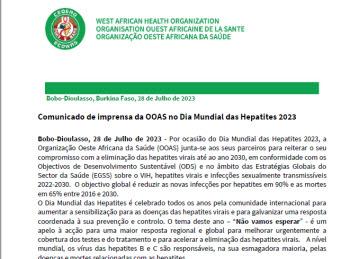
Bobo-Dioulasso, 28 July 2023 - On the occasion of the World Hepatitis Day 2023, the West African Health Organization (WAHO) joins its partners to reiterate its commitment to the elimination of viral hepatitis by the year 2030, in line with the Sustainable Development Goals (SDGs) and within the framework of the Global Health Sector Strategies (GHSS) on HIV, viral hepatitis, and sexually transmitted infections 2022-2030. The global target is to reduce new hepatitis infections by 90% and deaths by 65% between 2016 and 2030.
World Hepatitis Day is celebrated by the international community each year to raise awareness about viral hepatitis diseases and to galvanize a coordinated response to their prevention and control. This year’s theme - "We are not waiting" - is a call to action for a greater regional and global response to urgently improve testing and treatment coverage and to accelerate the elimination of viral hepatitis. Globally, hepatitis B and C virus account, overwhelmingly, for hepatitis-related sickness and deaths.
The ECOWAS Region bears the highest burden of viral hepatitis in Sub-Saharan Africa. According to the World Health Organization (WHO) Africa Viral Hepatitis Scorecard 2021, the ECOWAS region hosts ten of the 19 African countries with the highest Hepatitis B (HBV) endemicity (prevalence >=8%). All 15 ECOWAS member states have HCV prevalence (>=1%). This high burden may be partly due to the absence of effective programmes for the prevention and control of the diseases by 2021:
- Only about half of the ECOWAS countries had national hepatitis strategic plans, testing, and treatment guidelines.
- Only eight (53%) countries achieved the global target for HBV vaccination coverage (>90%)
- Only seven (47%) countries have implemented the essential strategy of HBV birth dose for the prevention of HBV
Furthermore, available country plans are not adequately funded. Elimination efforts are further impeded by limited country reporting, insufficient programmatic data, high cost of treatment, inadequate service coverage and cultural practices associated with the disease. Of particular concern are the very low diagnostic and treatment rates for HBV and HCV.
In the face of these challenges, WAHO has prioritised the elimination of viral hepatitis. In August 2021, the ECOWAS health ministers endorsed Regional Strategy for HIV, Tuberculosis, Hepatitis B & C and Sexual and Reproductive Health and Rights among Key Populations. The strategy seeks to position key populations in the national integrated response through partnerships, human rights approach, improved access to quality care and data management. In collaboration with her partners, WAHO has organised regional meetings and webinars to sensitize countries and the general public on the regional strategy and to promote its ownership. It has also organised a regional consultative meeting on measures to reduce stigma and discrimination against persons living with HIV and in key populations. WAHO will continue to provide support to countries to develop plans and programmes for elimination of viral hepatitis as well as to introduce a birth dose for hepatitis B vaccine. It is developing a strategic plan that will map out the needed regional actions towards the elimination of viral hepatitis.
We know the urgent actions that need to be implemented to make significant progress and should not wait any further. In particular, WAHO urges ECOWAS Member States, with support of Financial and Technical Partners, to establish or strengthen their integrated viral hepatitis elimination programme supported by relevant policy and legal support and strategic plans; develop a national health information system on viral hepatitis; provide subsidies for diagnosis and treatment; include viral hepatitis in their national health insurance schemes; and to reach the five GHSS service coverage targets for blood and injection safety, harm reduction, diagnosis and treatment, infant vaccination, and the prevention of mother-to-child transmission.
WAHO commends the Africa Union for leading the “Africa free of hepatitis” initiative. WAHO extends its gratitude towards the ECOWAS Commission and its member states, the World Hepatitis Alliance, the UN agencies, bilateral and multilateral organizations, donors, NGOs, the media, civil society, and communities for all their support in the fight against viral hepatitis and its elimination over the years.
Marching towards an Africa free of hepatitis!
We are not waiting!
